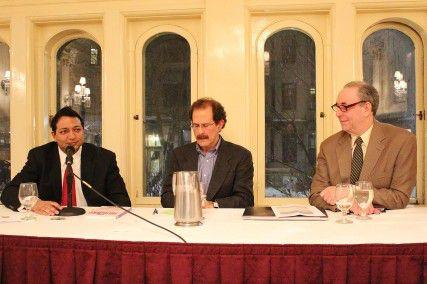
As social media use become increasingly prevalent in contemporary politics, Boston University hosted a book launch Thursday exploring media’s influence on the Obama Administration.
Co-authored by James Katz, College of Communication professor of emerging media, China Daily reporter Michael Barris and BU Metropolitan College teaching fellow Anshul Jain, The Social Media President: Barack Obama and The Politics of Digital Engagement focuses on the use of social media in political campaigning and in the governance during the Obama administration.
“This book in a lot of ways demonstrates some of the things we’re doing in the College of Communication,” said COM Dean Tom Fiedler, the opening speaker. “We’re really trying to understand how social media works and also how social media affects people in the way that communication is effective, so that lines up with the mission of COM.”
The authors explored the impact of social media as a political tool by reading excerpts from their book and making remarks on the writing process of the book.
Delving into the book’s primary theme of strategic social media use in political campaigns, Katz said there are three primary ways social media can be manipulated.
“One is to disseminate information to the public,” he said. “Another is to understand what the public is thinking and in a sense put its finger on the pulse of the public. And a third is to draw on insights or political opinions and policy guidance from the public … the third one would be the most transformative … but it’s also the one that is not used.”
Jain said writing the book during the presidential election forced the authors to remain vigilant of the constant new data coming from election coverage.
“A lot of the major writing and rewriting and interviewing went into this book in the midst of a presidential election cycles,” he said. “… So there was this constant influence, just this tsunami of new information coming in throughout election coverage. Doing that kind of editing and writing in real time was not an easy task.”
Data from the book was compiled from a variety of interviews and research spanning across both the Democratic and Republican campaigns, said Master-of-Ceremonies Elizabeth Crocker, a graduate research assistant to Katz at COM.
“I interviewed people who worked on Obama’s campaign … and one person who worked on Mitt Romney’s campaign,” she said. “We’re trying to incorporate all the different ways the public and the administration were able to engaged using these new media.”
The book also points to the movement of millennials toward active social media use and how the Obama campaign used technology to earn young votes.
“College students are aware of social media,” Barris said. “They [the Obama Campaign] kind of reinvented the whole way of using it [social media] as a PR tool, but they also used it to pressure people … Students can see there’s strategy that’s going on in politics and in some ways you see that politics is about power.”
Fiedler said attendees should walk away from the launch with an eagerness to question the relationship between democracy and a social media world that allows politicians to target voters more personally and effectively.
“Social media has made the process of campaigning much more efficient than it ever was before,” Fiedler said. “The question was, [if] it’s made campaigns more efficient, will it make governing more efficient? … I would hope some of that causes students to think about those issues which are fundamental to democracy.”
Andrew David, a fifth-year student in the Graduate School of Arts and Sciences, said he found it interesting that social media is only effective for gaining attention, not for governing.
“I thought their conclusion was going to be that there’s hope for this [social media as governing tool],” David said. “I was surprised at how it’s a good public relations, but not a good governing tool.”























































































































